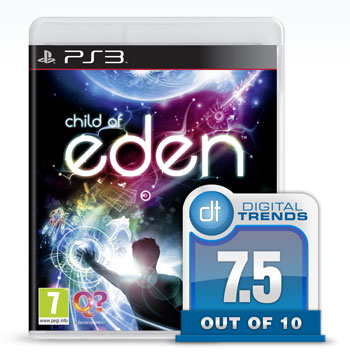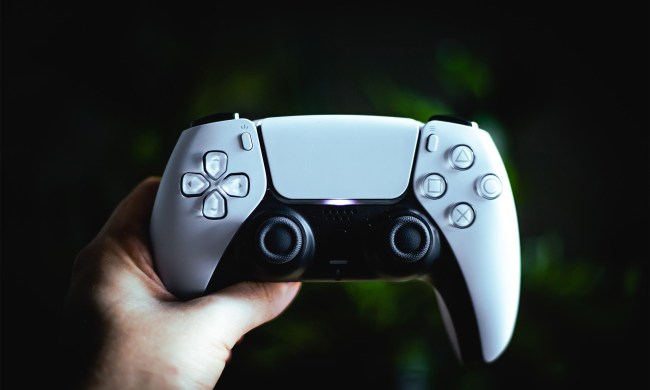 (This review is specifically for the PS3 version of Child of Eden, not the Xbox 360 version that uses the Kinect)
(This review is specifically for the PS3 version of Child of Eden, not the Xbox 360 version that uses the Kinect)
The first and most important thing to know about Child of Eden is that it is very weird. Japanophiles will recognize and understand immediately. And when the Japanese get weird, they can get really weird. In this case, it is the cool kind of weird, filled with original ideas that you may never have seen before, and visuals that may not make a lot of sense but are incredible to behold. After all, where else will you see a crystalline whale covered with colored viruses that you shoot with bass? If you have a quick answer to that, your life is far more interesting than mine.
Child of Eden is built around a method known as synesthesia, which the always reliable Wikipedia defines as: A neurologically based condition in which stimulation of one sensory or cognitive pathway leads to automatic, involuntary experiences in a second sensory or cognitive pathway. In other words, in this particular case, the game combines visuals and sounds, then encourages you to manipulate them through gameplay.
Like its spiritual predecessors and loosely connected chronological sequel Rez, Child of Eden is on on-rails shooter fused with electronic music that changes as you attack enemies. Unlike Rez, Child of Eden was originally developed for the Kinect, where the controls were handled through personal movement. It was an innovative and creative use of the style, and made for one of the best Kinect games to date.
Unfortunately the transition to the PS3 and the Move controller just isn’t the same. Child of Eden on the PS3 is still a good game, but it is just not made for the Move.
The Plot, Kinda
Child of Eden is a music driven game, filled with huge visuals and separated by five distinct levels, that tell a story. At least so says the dialog mixed with live action footage at the beginning of the game, which explains that Project Lumi is the key to reproducing a human personality in an AI. But as Project Lumi nears completion, it is attacked by a virus that you must destroy so that Eden can be born/created and grow up to become the site of the game Rez.

The plot is an afterthought—a framework to justify the gameplay. As it should be. To add a massive story to Child of Eden would be to take away from the abstract and surreal nature of the game that makes it unique. You have a mission, and you complete it by shooting things in auditory-centric ways. Adding any more to that would risk diluting the overall product.
The Move: The World’s Greatest Antibody
Child of Eden is an on-rail shooter that uses the Move controller as both a gun and a targeting sensor. When a virus appears on screen, you highlight it and any other enemies, then when then targeting reticule is full you snap the controller to unleash several lasers. If you prefer, you can skip that and use the trigger as a machine gun-like weapon to eliminate all the incoming viruses and projectiles coming at you, but your score will suffer, and the game will be much harder.
The sound and the music are key here. When attacking powerful enemies with a central core, using the machine gun-like attack on the primary target adds a rapid drum beat as you strike it. If you time them correctly, targeting and releasing the primary attack becomes part of the electronic score. The visuals are impressive—sometimes even incredible in an abstract way—but this game is really about the audio, and using the attack to build the depth of the music rarely gets old.

When it works, the Move controller is fun. You use it like a wand and releasing a fully targeted attack is satisfying. The trigger guns are also entertaining as you blast incoming attacks, but there are some issues as well.
One of the problems with the Move is that you will need to continually recalibrate. The more you move the controller around the screen, quickly flinging it from one side to the other then snapping it to release attacks, the faster it will lose its calibration. This isn’t a major deal, and is easily and quickly resolved by recalibrating, but it gets old.
The other, far bigger issue is that the Move is fun to use… for a bit. After the novelty wears off, it really isn’t much different than just using a controller. It is an on-rails game, which does not really add much when using the Move. The Kinect was an immersive and intriguing way to play by using your full body, but in this instance the Move is just a variation of a controller. And once you take that away, the rest of the game becomes a bit more suspect.
A Short Game or a Long Concert
Since Child of Eden really isn’t concerned about story or progression, the length of the game wasn’t a priority for developer Q Entertainment. And with the Kinect, which was an experiment in gameplay, the length wasn’t really an issue either. You would probably only want to play for a bit, as it could be tiring on the Kinect, but with the Move that isn’t an issue and the game is over in a flash.

The Move controller is innovative, and on some games it is an amazing device, but not on Child of Eden. There just aren’t enough differences between it and a standard controller. Take away the novelty of the controls and you are left with a very short game that can be easily completed in a few hours. There is a free play that doesn’t feature damage, but it doesn’t really add anything as much as offer an easier difficulty, which isn’t really a bad thing. The game is never hard, but it can be frustrating as you are struck by objects outside your field of vision, partly due to the way the Move controls what little camera work there is to control.
Conclusion
Child of Eden is an original and innovative title that offers an entirely new take on video games… for the Kinect. Using a Move controller, the game is still fun, but it loses a huge amount of that innovation and becomes a very short game that doesn’t offer all that much.
The music is incredible, and fans of electronica may want to check it out for that alone. It is also an amazing game visually–sometimes even beautiful. But the gameplay is a novelty, and even though the music remains strong and the ability to manipulate it is cool, that novelty wears off quickly and the game falls into traditional patterns of point-and-shoot gameplay which makes it more fun to watch and listen to than play.
Child of Eden is worth a look, especially for fans of music-based games like Rez, but the potential for this game lies elsewhere. What there is of it is fun, but without the completely different controller style, you are left with an all too brief on-rails shooter, no matter how shiny the controller you are using is.
Score: 7.5 out of 10
(This game was reviewed on the PlayStation 3 on a copy provided by Ubisoft)


